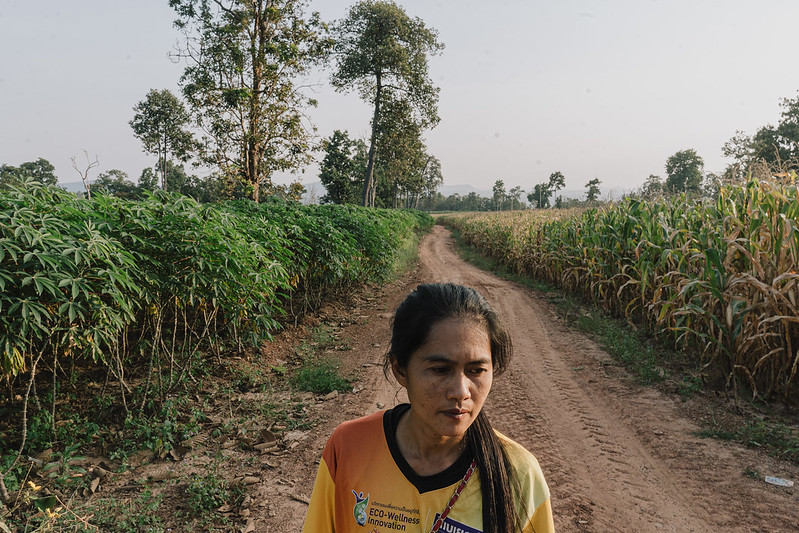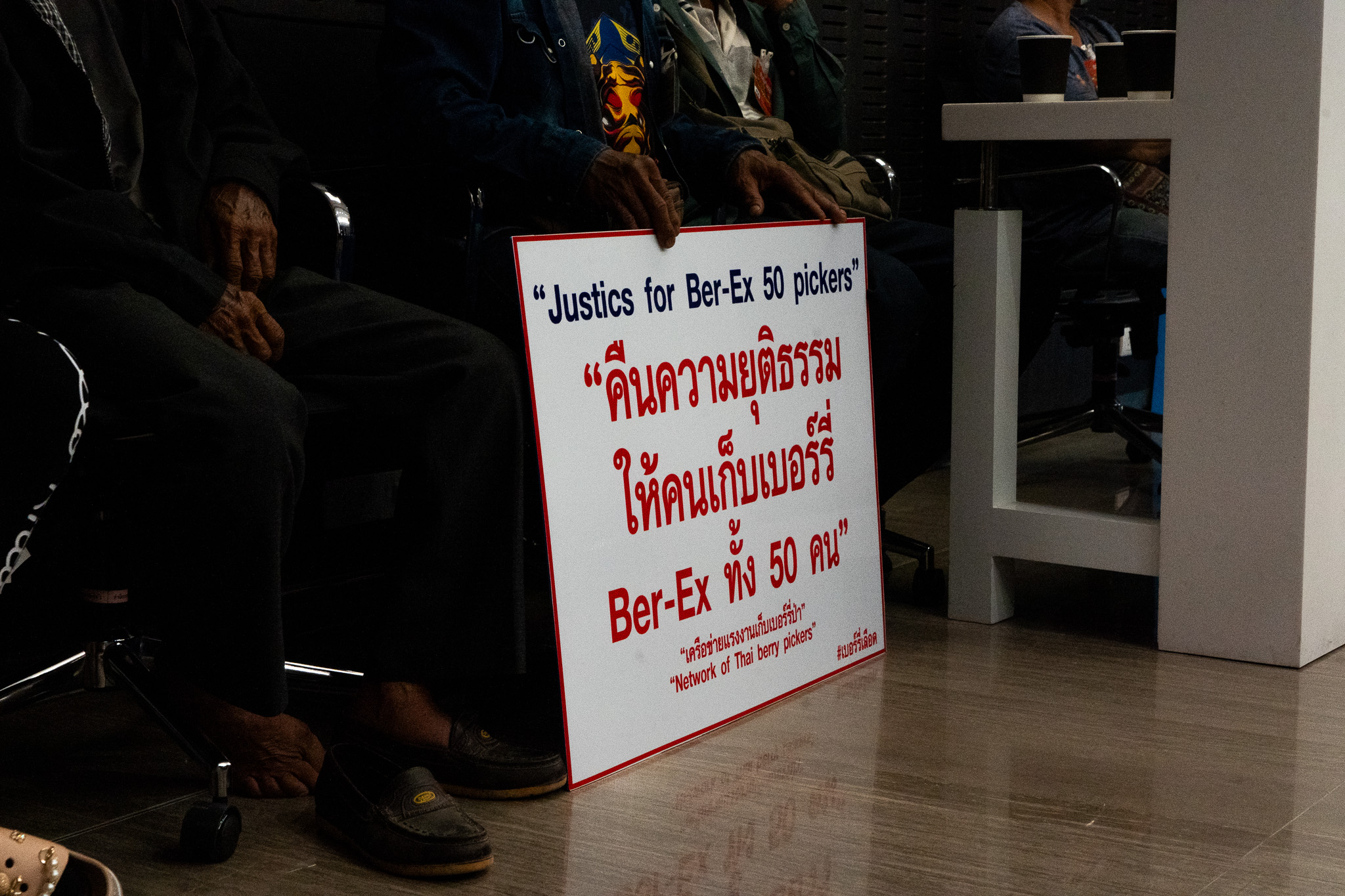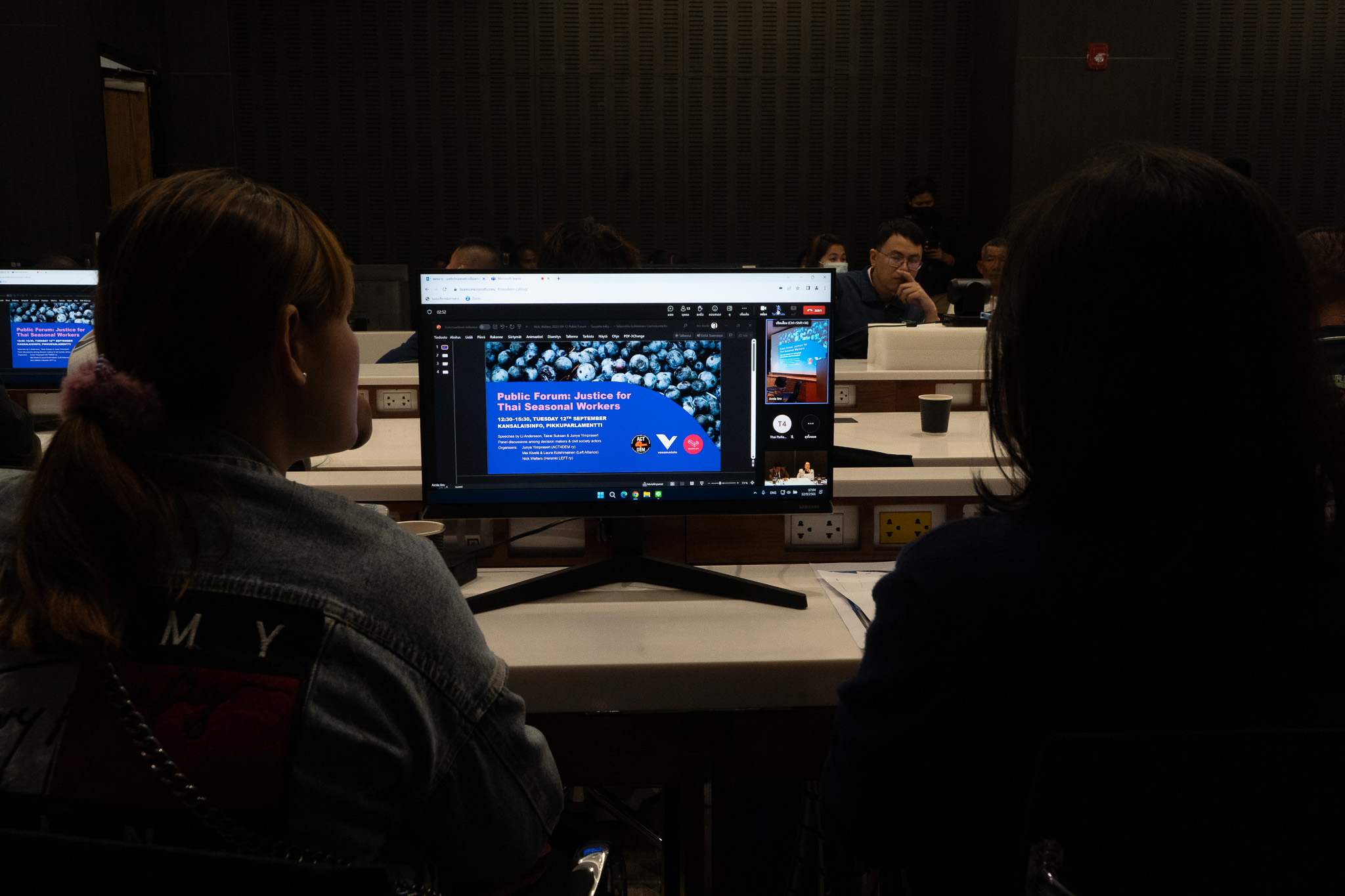Guest contribution by Bria Kalpen
Nittiya Muangklang and the 18 other villagers on trial live in Sub Wai village in Sai Thong National Park in Chaiyaphum province. They are one of many communities in Isaan fighting for their rights to the land that they say has been confiscated by the government over the past four years. For decades, the state has been giving and taking away land rights, and forest communities have consistently been caught in the crossfire.
On Thursday evenings, Nittiya’s house becomes Sub Wai villages’ hotspot.
The street outside would be pitch black if it wasn’t for the light escaping from the houses that line it. Voices can be heard coming from Nittiya’s home, and if you peeked inside, a full family-style feast is prepared with more than 20 other villagers digging in and chatting purposefully.
It seems like a regular dinner party, but this gathering is far from a celebration. There are no smiling faces, no loud bellows of laughter, no mo lam music blasting in the background. They’re not dancing or having small talk,or catching up on the latest gossip.
They’re discussing the fate of their livelihoods.
“I am one of 19 Sub Wai villagers being charged with trespassing on national park property, and together we are working to beat these charges and regain the rights to our land,” Nittiya explains.

The government cites the villagers’ farming as a reason for why they must leave the forest, while the villagers say that they are more than willing to adopt agricultural practices that would contribute to forest conservation. File photo from 2016.
The battle began in 1953 at the onset of Thailand’s so-called development era. That year, 55 percent of the country’s total area was covered by forest, so the government decided to distribute some of the forest area to private logging companies in order to fund the country’s development projects.
Fast forward 35 years to 1988, when an especially torrential rainy season caused devastating floods and landslides, pushing the government to stop the logging concessions to prevent further deforestation and soil erosion. After a reduction of the national forest area from 40 percent to 27 percent, the government planned to plant new trees in the areas that logging companies had cleared out; however, it had neither the manpower nor the space to do so since many of the areas were now inhabited by villagers.
“Our ancestors came here decades before any land was declared government property,” Nittiya claims. “This forest is rightfully ours.”
And she’s right—sort of. In 1972, the parents and grandparents of Nittiya and many of her neighbors started settling in Sub Wai village after a logging company moved out of the area, leaving a large open plot for them to claim. The land the new owners built their homes on was free of claim, but the area where they began farming cassava was part of Sai Thong National Park. The villagers farmed cassava for more than 40 years without being told they were trespassing or asked to leaved, but the 2014 military coup changed that.
That year, the “Forest Master Plan” made its debut. The plan aimed to increase the national forest area by 26 million rai of land in order to “resolve the problems of forest destruction, trespassing of public land and sustainable management of natural resources.” Another policy, Order 64, was passed to authorize the national park officers to retrieve government-owned land from trespassers. This new mandate seems to have good intentions to some, but according to Nittiya, intentions are not enough to justify the effects impacting Sub Wai villagers.
“My grandmother was home alone when armed national park officers came and threatened her with violence to get her to sign our land over to the government,” Nittiya explains. “I have had no choice.”
Nittiya and other Sub Wai villagers claim that the government uses scare tactics to persuade them to give up their land titles in an effort to reach the master plan’s 26-million-rai goal. The villagers’ cassava farms are generally located on the land the government has been confiscating, so when they sign away their rights to the land, they essentially sign away their primary source of income.
“Without land, I don’t even know where I’m going to find income,” says Suwalee Poh-Ngan a Sub Wai villager whose land has also been confiscated. Nevertheless, a piece of paper and a signature does not stop her from tending to her crops.
Suwalee and other villagers continue to farm on the land despite no longer having legal rights to do so, and as a result, 19 of them have been sued for trespassing on national park property. If found guilty, some villagers could spend up to 18 months in prison and fined as high as 600,000 baht.
“I don’t want to arrest people. I feel sad for them,” says Sriworkam, the operational officer at Sai Thong National Park. “But when I see a tree being burned down for agriculture or chemical farming and mono-cropping being practiced, I believe it is negatively affecting the environment.”
“I think this is one way the government is trying to distort the reality of the situation,” he says. “The government claims that these people cut down trees and practice unhealthy agriculture to justify their wrongful actions.”
Small-scale farmers are not the primary threat to the national forests according to Dr. Alongkorn Akasaeng, a professor at Mahasarakham University and long-time member of what is sometimes termed, “the People’s Movement.” He questions the integrity of the RFD and suggests that the government is not being transparent with its use of the confiscated land.
“The RFD has a hidden agenda,” he argues. “Twenty-five percent of the land is research forest and 15 percent is actually for industrial purposes.”
Alongkorn’s allegation contradicts the Royal Forest Department’s statements. The RFD says Order 64 is meant to target investors, and even passed another mandate—Order 66—to exclude poor people from Order 64 and protect them from being sued by the government. However, there is a disconnect between the government’s definition of “poor” and the reality of poverty in the eyes of the villagers.
“I think the word farmer should be left to mean poor,” says Nittiya. The RFD states that anyone who owns less than 25 rai of land is poor, and considers those who own more than that to be investors. Several of the Sub Wai villagers, including Nittiya, “own” more than 25 rai of land, but they still consider themselves small-scale farmers in comparison to the big industrial companies that are supposed to be targeted.
To make matters even more complicated, Order 66 has not completely stopped “poor” farmers from being stripped of their customary land titles and sued.
“The judicial system isn’t really fair because I’m not an investor, I’m just making a living,” says Wanchai Aporkaew, another Sub Wai villager. Wanchai only farms 14 rai of land and meets the RFD’s standard for poor; however, all of his land has been seized by the government and he is still being sued for trespassing. Despite his socioeconomic status, Wanchai has not only lost all of his land, but has been hit with one of the highest fines of anyone on trial at a steep 600,000 baht.
“We feel like they don’t care about us,” Nittiya says. “The government just wants to seem like they are doing something good so that people can see them doing it, but we have to suffer in return.”
They may be facing some harsh charges and the possibility of losing their livelihoods, but the Sub Wai villagers are not going down without a fight. Nittiya and her community has teamed up with the Isaan Land Reform Network (ILRN), a local NGO network, to combat their charges and find new solutions to the current land rights issue. The ILRN works with farmers throughout Isaan to help them protect their land rights by providing free legal counsel and financial support, as well as offering free information workshops on the Thai judicial system and how to properly prepare for their trials.
The ILRN’s leader, Pramote Pholpinyo, says the government needs to understand the villagers’ relationship with the land in order for them to reach a solution.

What hangs in the balance in the courts is whether the government continues with its legalistic zero-sum approach, or is compelled to adopt a more nuanced approach to the rights of people who have lived and farmed on national forest land for generations.
“We are not against the preservation of the forest,” Promote argues. “People want to preserve the forests as well to be able to manage their land, but the judicial system itself is not just. Laws, policies, regulations, and orders seem to do anything but meet the needs and wants of the people they purportedly written for.”
The concept of issuing community land titles is what would meet the people’s wants and needs, according to Pramote. This type of land title would allow members of the Sub Wai community to have joint ownership of the property they are currently being sued over so that they could preserve and manage the forests legally. The Sub Wai villagers and Pramote are also putting forward proposals that demonstrate the ways they could preserve the forest, such as by planting new trees where old ones have been cut down.
“By explaining how villagers have been losing their resources and proposing the community land title and preservation plans, this could help serve to oppose the government’s claim that the villagers have no capacity to take care of the forest,” says their lawyer, Thanomsak.
These cases and proposals are what have turned Nittiya Muangklang’s home into Thursday night’s main event.
“We have to be as prepared as possible when we go to court,” Nittiya says. “We hold weekly meetings in this home to make sure that everyone has the information they need to form the best cases possible, and so that we can support one another through this process.”
With just a ninth-grade education, she has more schooling than all the villagers involved and so she’s been appointed as the leader of their community coalition. As of September 27, all villagers on trial have been found guilty of charges against them, but all have staved off their sentences by lodging appeals, now beyond the Appeals Court and heading for the Supreme Court.
“People now have more hope,” Nittaya says. “The government might help us and drop the charges after they’ve seen our proposals.”
Until the next phase of the process, Nittiya and the other villagers will continue to plan and strategize from her dinner table in the hopes that they will get their land back for good.
“This is our home. It is all we have,” she says. “So, we will keep fighting until we receive the justice we deserve.”
Bria Kalpen is a fourth-year journalism student at Northwestern University in Evanston, IL. This semester she studied about development, globalization, and human rights issues in Khon Kaen this past fall semester.




